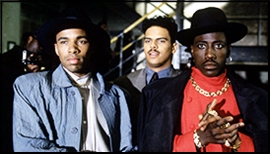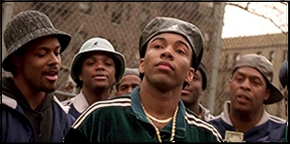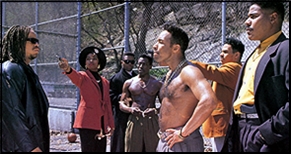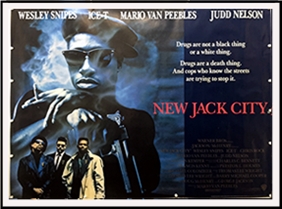Sun 12 Apr 2020
A Movie Review by Jonathan Lewis: NEW JACK CITY (1991).
Posted by Steve under Crime Films , Reviews[2] Comments

NEW JACK CITY. Warner Brothers, 1991. Wesley Snipes, Ice-T, Allen Payne, Chris Rock, Mario Van Peebles, Vanessa Williams, Judd Nelson. Director: Mario Van Peebles.
The movie begins with a panorama aerial view of New York City, focusing squarely on the World Trade Center. (This was a decade before 9/11). That’s the cosmopolitan New York of high finance, of reaching for the heights and succeeding beyond all possible measure. But the camera doesn’t linger on that particular landmark for very long. Instead, it heads uptown and stops in Harlem. That’s where we see two men dangling another man from a bridge. Sure enough, they drop him into the river below. Just another casualty of the violent drug trade.
What New Jack City does best is immersing you in the mean streets of Harlem in the late 1980s and early 1990s. Drawing upon blaxploitation cinema from the 1970s, the movie most definitely has a political point of view. Yes, the drug trade is horrible and is controlled by self-serving sociopaths. And yes, Blacks who partake in that criminal enterprise are killing their own people. And this needs to be understood within the context of a broken economy with staggering unemployment rates in neighborhoods like Harlem.

Lest you think that the film excuses or glamorizes the crack cocaine dealers, I will let you know that it assuredly does not. The movie actually takes the point of view of Scotty Appleton (Ice-T) a New York cop whose animosity toward drug dealers isn’t merely professional; having lost his mother to a dealer’s violence, it’s deeply personal. Appleton enlists the help of a recovering crack addict (a youthful Chris Rock) to bring down Nino Brown (Wesley Snipes), a vicious drug kingpin whose gang has taken over an entire apartment building. Much of the movie moves along at a quick enough pace, with occasional interspersed vignettes in which the viewer gets to witness the degradations of addiction.

While there’s nothing wrong with the movie’s narrative per se, it suffers from wearing its influences far too flamboyantly on its sleeve. There’s barely a gangster movie trope that doesn’t make its appearance here. And having Nino (Snipes) watching Al Pacino’s Scarface on television and mentioning James Cagney in passing only serves to remind the viewer that pretty much everything you’re seeing in the story is something you’ve seen done better and with more originality before.
Wesley Snipes is great, though. He exudes a dangerous swagger, a ruthless confidence in his invincibly. The world is his, he exclaims at one point. He’s not a villain, he implores. He’s merely a victim of an unjust world. It’s a thoroughly convincing portrait of a man hopelessly deluded by the chimera of power. Like gangsters in movies time and again, it will be his hubris that brings him down to earth.

April 12th, 2020 at 10:17 pm
I used to like director Mario Van Peebles back in the 1990’s. Especially:
Posse
Gang in Blue.
My reaction to “New Jack City” was pretty much like this review: a moderately interesting film with some good points – but not really brilliant.
Haven’t seen any of these in decades.
April 14th, 2020 at 1:41 am
Likely Snipes best performance. Sadly it isn’t enough to make this a really good film, but you see that it could have been.